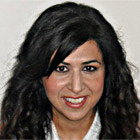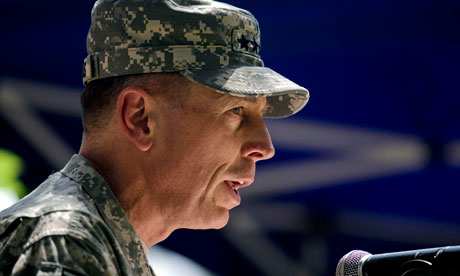
-
-
Wednesday 23 February 2011 22.59 GMT
- Article history
-

According to a recent report, in a meeting with Afghan government officials, Nato's commander, General David Petraeus, allegedly insinuated that some Afghan parents deliberately burn their children's hands and feet to present them as civilian casualties. Presumably, parents loyal to the Taliban do so as a form of moral blackmail to shame the troops into stopping operations, or alternatively, to receive financial compensation.
Since neither Kabul nor Petraeus has so far officially responded to this allegation, the truth or otherwise of the gaffe and its underlying charge have not yet been established. But, true or false, the incident merits scrutiny because of its sheer emotional power.
The fact that a man of Petraeus's calibre seemingly feels he can allow himself such a slip shows that Kabul's allies have lost their respect for all Afghans, ordinary civilians and government officials alike. Perhaps, there never was much respect, but the Bush administration at least kept the pretence of an equal partnership. But since President Obama's election in 2008, tongues have loosened and diplomatic mishaps, rather than hard news, tend to dominate the international press.
Petraeus's alleged slip is the most recent example of a development in which Afghans are presented as the sole guilty party responsible for all failures, from nation-building to stability and peace. There is some truth in this, but let us not forget that the international community's involvement in Afghanistan has always been morally ambiguous and that the current failures are a shared responsibility. Be that as it may, one cannot help but suspect that by such witting or unwitting dehumanisation of Afghans, the ground is being prepared for the international community to leave the country without feeling a sense of shame or betrayal for abandoning their promises of long-term solidarity with Afghans.
An equally sad truth for ordinary Afghans is that their government has lost the moral high ground, and so can hardly object to such negativity or insults. The ruling class's looting of international aid, which was meant to ensure a decent future for Afghan children, smacks of cruel indifference towards its own people. Its political cronyism has made a mockery of democracy. Its objection to US military operations is equally hypocritical
After all, the regime needs the troops for its own survival and if Afghan children are wounded in such operations, they are rarely the children of the establishment. The offspring of the ruling class are more likely to be found on the campuses of US Ivy League universities than on the battlegrounds of Afghanistan. The even sadder truth is that there is no such thing as ordinary Afghan children: there are the pampered children of the rich and the neglected offspring of the poor. Their Afghan-ness is only nominal and does not mean equality. If the former prepares for a takeover of the politico-financial family business by training in western universities, the latter is sent at night to fetch free petrol from a stranded tank and ends up being wounded in an aerial bombing.
All this is happening in plain view, with the active participation of the Afghan ruling class. The country's political representatives are too morally compromised to raise their voices even if they feel genuinely insulted by Petreaus's alleged insinuation.
The fact is that Afghan children are unfortunate human beings, who emerged from the ashes of the cold war in a militarised zone. While their parents' anti-Soviet war allowed children in London, Moscow and New York to grow up in a world free from nuclear threat, the danger to their own lives multiplied with mines and rockets, diseases and starvation. Even today, being wounded in a military operation is only the culmination of a tragic existence in which childhood years are filled with adult duties. The responsibility for the continuation of this cruelty lies firmly with the country's leadership in Kabul and with its enemies, the Taliban and other, lesser-known insurgents.
By ransacking international aid, by stubbornly refusing to make peace, both sides of the conflict have betrayed Afghan children – for reasons of greed and a false sense of pathos. Neither side has protected the people and so both lack the moral credential they would need to criticise Petraeus or any other foreign official with a careless tongue. In fact, it was the Kabul officials and insurgency leadership's undeniable disdain for ordinary Afghans that ultimately legitimised the international community's own increasingly dismissive attitude towards the country.
If Afghans don't care for their own people, why should the international community? In real life, this is a fair attitude, albeit a morally questionable one.
Afghan children process this grim reality by playing war games. These days, their repertoire includes the story of the suicide bomber. Hence on YouTube, we can watch a group of 3-12 year olds play the "martyrdom" rituals, complete with scenes of farewell, explosion and identification of the dead. Such horrific visions are testimony to the fact that Afghan children are the only truly innocent victims of this war, caught as they are between their government's looting, the insurgents' cruelty and the international community's contempt.

No comments:
Post a Comment